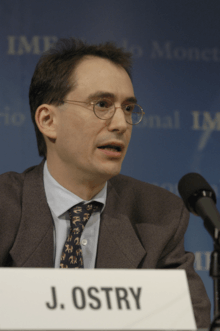Jonathan D. Ostry
 | |
| Born | July 29, 1962 |
|---|---|
| Nationality | Canadian |
| Institution | International Monetary Fund |
| Field | International economics |
| Alma mater |
Oxford University London School of Economics University of Chicago |
| Information at IDEAS/RePEc | |
Jonathan David Ostry (born July 29, 1962) is an international economist, who is currently Deputy Director of the Research Department of the International Monetary Fund.[1][2] His recent work has focused on the management of international capital flows, in particular the role of capital controls; this work has been influential in bringing about a shift in the institutional position of the IMF on capital controls.[3][4][5][6] Ostry has also published influential studies on the relationship between income inequality and economic growth, where his work—which has featured prominently in the financial press[7][8][9]—suggests that high income inequality and a failure to sustain economic growth may be two sides of the same coin. His other work focuses on fiscal sustainability issues (especially the role of a country’s track record of fiscal management in enabling it to access the international capital markets).[1][10] Ostry has many distinguished academic publications, and his work has been cited widely in scholarly journals, and in the press, including the Economist, the Financial Times, the Wall Street Journal, the New York Times and the Washington Post.[3][4][7][8][9][11][12]
Early career
Ostry received a B.A. (with Distinction) from Queen’s University (Canada), where he was an Undergraduate Medallist, at the age of 18. He then went on to do another B.A. at Oxford University (Balliol College) as a Commonwealth Scholar in Philosophy, Politics and Economics, followed by an M.Sc. at the London School of Economics. He earned his Ph.D. in Economics at the University of Chicago, where he was a Mackenzie King Fellow, Social Sciences and Humanities Research Council Doctoral Fellow, and Pew Fellow.[1] He has held several senior positions at the IMF, including leading country teams on Japan and several Asian countries, and leading the team that produces the IMF’s flagship World Economic Outlook.[1][10][13]
Research and publication
Ostry’s work covers various aspects of domestic and international macroeconomic policy, including exchange rate regimes, capital controls, fiscal space, and income inequality. He has written and edited several books on international economic matters, and has published numerous articles in scholarly journals, such as the American Economic Review, the Economic Journal, the Journal of Monetary Economics, the Journal of International Economics, the Journal of Development Economics, among others.[1][14] His work has featured extensively in the financial press, including in the Economist,[3][7][11] the Financial Times,[4] the New York Times,[8][15][16] the Wall Street Journal,[12][17] the Washington Post,[9] Business Week,[18] and National Public Radio.[19]
Ostry was listed in Who’s Who in Economics in 2003.[2]
Personal information
Ostry was born in Ottawa, Canada.[2] He is the son of Sylvia Ostry and Bernard Ostry.[20][21]
References
- ↑ 1.0 1.1 1.2 1.3 1.4 Research at the IMF: Jonathan D. Ostry
- ↑ 2.0 2.1 2.2 Mark Blaug and Howard R. Vane (2003). Who's who in Economics: 4th ed. Cheltenham & Edward Elgar Pub.
- ↑ 3.0 3.1 3.2 The Economist (February 18, 2010), The IMF changes its mind on controls on capital inflows.
- ↑ 4.0 4.1 4.2 The Financial Times (February 22, 2010), IMF reconsiders capital controls opposition.
- ↑ The Economist (April 07, 2011), The Reformation: A disjointed attempt by the IMF to refine its thinking on capital controls.
- ↑ Capital Controls.
- ↑ 7.0 7.1 7.2 The Economist (October 13, 2012), Having Your Cake: Less Inequality Does Not Need To Mean Less Efficiency.
- ↑ 8.0 8.1 8.2 The New York Times (October 15, 2011), America’s ‘Primal Scream’.
- ↑ 9.0 9.1 9.2 The Washington Post (March 24, 2012), The False Choice Between Equality and Efficiency.
- ↑ 10.0 10.1 Jonathan D. Ostry (IMF): VoxEU
- ↑ 11.0 11.1 The Economist (October 06, 2012), Tide Barriers: Capital Controls Would Work Better If There Were Some International Norms.
- ↑ 12.0 12.1 The Wall Street Journal (September 02, 2010), IMF Warns Countries of Debt Risks, Dismisses Idea of Greek Default.
- ↑ Jonathan D. Ostry: Huffington Post
- ↑ IDEAS: Jonathan D. Ostry
- ↑ The New York Times (December 10, 2011), The 1 Percent Club’s Misguided Protectors.
- ↑ The New York Times (October 16, 2012), Income Inequality May Take Toll on Growth.
- ↑ The Wall Street Journal (September 14, 2012), Economists: QE3 Shouldn’t Trigger Wall of U.S. Money Into Emerging Markets.
- ↑ Business Week (Oct 13, 2011), Growing Income Gap May Leave U.S. More Vulnerable to Crisis.
- ↑ National Public Radio (March 18, 2010) http://www.npr.org/templates/story/story.php?storyId=124792660 Global Reality Challenges IMF's Free Market Gospel.
- ↑ Sylvia Ostry.
- ↑ Bernard Ostry.